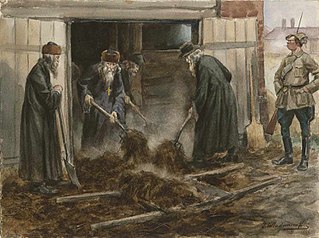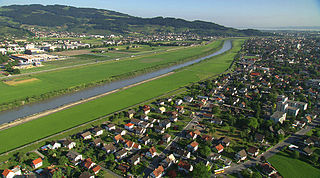
Conscription, also known as the draft in American English, is the practice in which the compulsory enlistment in a national service, mainly a military service, is enforced by law. Conscription dates back to antiquity and it continues in some countries to the present day under various names. The modern system of near-universal national conscription for young men dates to the French Revolution in the 1790s, where it became the basis of a very large and powerful military. Most European nations later copied the system in peacetime, so that men at a certain age would serve 1 to 8 years on active duty and then transfer to the reserve force.

Vorarlberg is the westernmost state of Austria. It has the second-smallest geographical area after Vienna and, although it also has the second-smallest population, it is the state with the second-highest population density. Two thirds of the state are situated above 1,000m. It borders three countries: Germany, Switzerland, and Liechtenstein. The only Austrian state that shares a border with Vorarlberg is Tyrol, to the east.

Hohenems is a town in the Austrian state of Vorarlberg in the Dornbirn district. It lies in the middle of the Austrian part of the Rhine valley. With a population of 16,946, it is the fifth largest municipality in Vorarlberg and currently has the fastest population growth in the state. Hohenems' attractions include a Renaissance palace dating back to the 16th century, a Jewish history museum, and the old town center.

The Bregenzerwald is one of the main regions in the state of Vorarlberg (Austria). It overlaps, but is not coterminous with, the Bregenz Forest Mountains, which belong to a range of the Northern Limestone Alps, specifically the northern flysch zone. It is the drainage basin of the Bregenzer Ach river.

Forced labour, or unfree labour, is any work relation, especially in modern or early modern history, in which people are employed against their will with the threat of destitution, detention, or violence, including death or other forms of extreme hardship to either themselves or members of their families.

Corvée is a form of unpaid forced labour that is intermittent in nature, lasting for limited periods of time, typically only a certain number of days' work each year. Statute labour is a corvée imposed by a state for the purposes of public works. As such it represents a form of levy (taxation). Unlike other forms of levy, such as a tithe, a corvée does not require the population to have land, crops or cash.

Military service is service by an individual or group in an army or other militia, air forces, and naval forces, whether as a chosen job (volunteer) or as a result of an involuntary draft (conscription).

Lustenau is a town in the westernmost Austrian state of Vorarlberg in the district of Dornbirn. It lies on the river Rhine, which forms the border with Switzerland. Lustenau is Vorarlberg's fourth largest town.

Au is a town in the Bregenz Forest in Vorarlberg (Austria).

Between 1956 and 2011, Germany conscripted men subject to mandatory military service. After a proposal on 22 November 2010 by Karl-Theodor zu Guttenberg, the German Minister of Defence at the time, Germany put conscription into abeyance on 1 July 2011. While the German constitution retains the legal instruments for reintroducing conscription in Germany, currently only men over 18 years of age can be conscripted whilst women cannot under any circumstance be required to "serve with a weapon".

An eingetragener Verein, abbreviated e.V., is a legal status for a registered voluntary association in Germany. While any group may be called a Verein, registration as eingetragener Verein confers many legal benefits, because it confers the status of a juridical person rather than just a group of individuals. The legal status must be mentioned in the name as well. Like certain other corporate bodies, an eingetragener Verein can apply for the status of a charitable organization.

A district is a second-level division of the executive arm of the Austrian government. District offices are the primary point of contact between residents and the state for most acts of government that exceed municipal purview: marriage licenses, driver licenses, passports, assembly permits, hunting permits, or dealings with public health officers for example all involve interaction with the district administrative authority.
The Kennkarte served as the basic identification document issued to German nationals from the age of 15 onwards, with place of residence or permanent residence in the territory of Germany during the Third Reich era, and extended to include citizens of German-occupied territories. It was introduced through the ordinance on identity cards of July 22, 1938 as a "police-issued general domestic identity card".

Civil conscription is the obligation of civilians to perform mandatory labour for the government. This kind of work has to correspond with the exceptions in international agreements, otherwise it could fall under the category of unfree labour. There are two basic kinds of civil conscriptions. On the one hand, a compulsory service can be ordered on a temporary basis during wartimes and other times of emergency, like severe economic crisis or extraordinary natural events to provide basic services to the population. These include, but are not limited to, medical care, food supplies, defense industry supplies or cleanup efforts, following a severe weather or environmental disaster for the duration of the emergency. Therefore, it generally makes striking illegal for the duration of the civil mobilization. On the other hand, a revolving mandatory service may be required for a longer period of time, for example, to ensure community fire protection or to carry out infrastructure work at a local or community level.
A resident register is a government database which contains information on the current residence of persons. In countries where registration of residence is compulsory, the current place of residence must be reported to the registration office or the police within a few days after establishing a new residence. In some countries, residence information may be obtained indirectly from voter registers or registers of driver licenses. Besides a formal resident registers or population registers, residence information needs to be disclosed in many situations, such as voter registration, passport application, and updated in relation to drivers licenses, motor vehicle registration, and many other purposes. The permanent place of residence is a common criterion for taxation including the assessment of a person's income tax.

Peter Thumb was an Austrian architect and master builder whose family came from Bezau, Vorarlberg, in the westernmost part of Austria. He was active in Baden, the Black Forest, Alsace, Upper Swabia, on and around Lake Constance, and in Switzerland. He is best known for his Rococo architecture, mainly in Southern Germany. Outstanding examples of his work include the pilgrimage church at Birnau on Lake Constance and the monastery library at the Abbey of Saint Gall, Saint Gallen, Switzerland.
The Zivildienst is the most common mandatory alternative service for conscientious objectors of the national military service in the Austrian Armed Forces. Officially called Zivildienstleistender (ZDL) or Zivildiener it is common to call them Zivi. Since 1975, drafted men may refuse the military service on conscientious reasons and serve in the compulsory alternative community service instead. This generally involves work in social services like hospitals, youth organisations, nursing homes, rescue services, emergency medical services, and care of the disabled. The service usually lasts nine months. About more than 40% of the drafted male citizens in Austria choose this option by declaring a conflict of conscience. There is no conscription for women, therefore women are not obliged to serve as a Zivi, which is just a substitute for the still existing mandatory military service.

A compulsory fire service is a mandatory service for the local fire departments in Switzerland in general and in Austria and Germany in exceptional cases as well. Private individuals can be compelled to participate in such a fire service in specific circumstances. In Singapore conscripts are deployed as fire fighters when serving in the Singapore Civil Defence Force (SCDF).
The Prostitutes Protection Act (Prostituiertenschutzgesetz) is a German Federal Law that was enacted on 21 October 2016 and came into force on 1 July 2017. Core elements are the introduction of a permit requirement for all prostitution trades and a registration certificate for prostitutes. The intent of the law was to better protect prostitutes and fight crime. Interest groups criticized the law, which they claim penalizes and endangers prostitutes and a constitutional complaint was filed in June 2017.
The Prostitution Act is a federal law in Germany that regulates the legal status of prostitution as a service in order to improve the legal and social situation of prostitutes. The law was promulgated on 20 December 2001 and has been enforced since 1 January 2002. At the same time the Strafgesetzbuch §180a and §181a (pimping) were amended to allow for employment of prostitutes, as long as they were not exploited.










